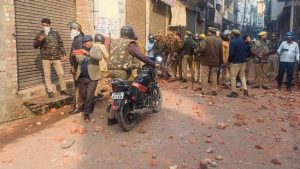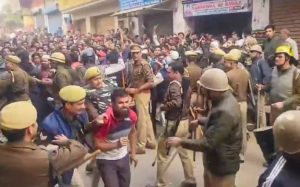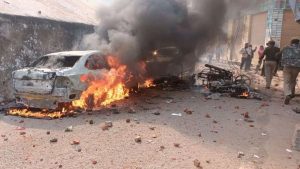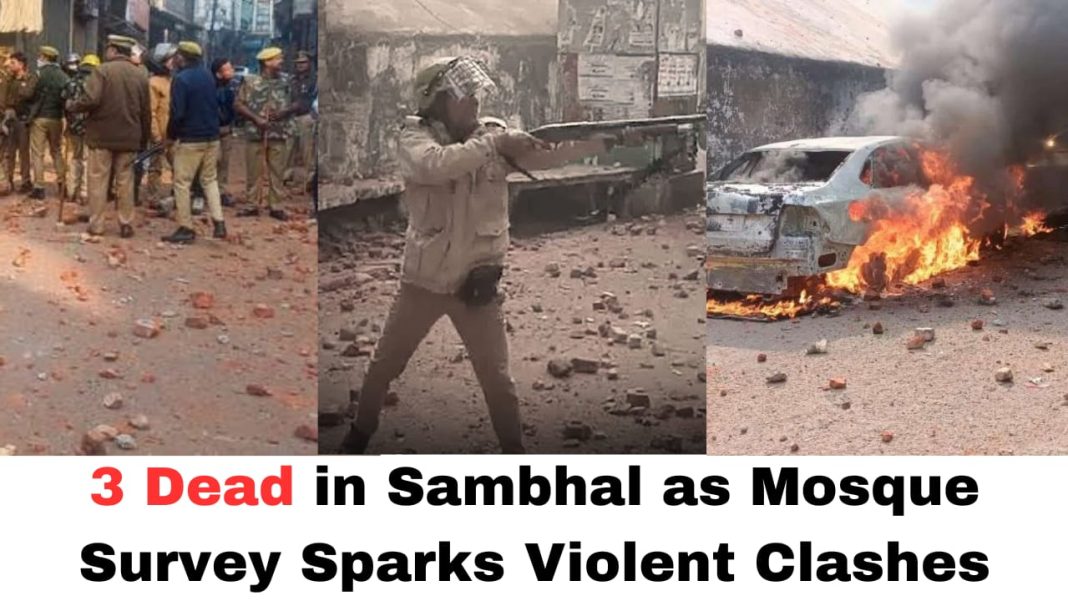Digital News Guru Uttar Pradesh Desk:
On November 24, 2024, communal tensions escalated in Sambhal, Uttar Pradesh, following a court-ordered survey of the Shahi Jama Masjid. The situation turned violent as 3 people were killed and several others injured during clashes. The controversy stems from a petition alleging that the mosque was constructed over the remains of a Hindu temple destroyed by the Mughal emperor Babur in 1529. The court ordered the survey to verify the claims, sparking outrage among the local Muslim community.
Sambhal Dispute
The petitioner, Rishiraj Giri, supported by others, argued that the mosque was originally the Harihar Temple, an important religious site for Hindus. This claim echoes past disputes, including the contentious Ram Janmabhoomi case in Ayodhya. The mosque’s management refuted these claims, asserting that the structure has been a place of worship for centuries and is protected under the Places of Worship Act, 1991, which prohibits altering the religious status of structures as of 1947.

Events Leading to Violence
As survey officials, accompanied by police, arrived at the mosque, a large group of protesters gathered, condemning the court’s decision. The situation quickly deteriorated, with stone-pelting and arson reported. Several vehicles, including motorcycles, were set ablaze. Videos of the incident circulated online, further inflaming communal sentiments. The violence claimed three lives and left many injured.
Political Reactions
Political parties have weighed in on the issue, with the Samajwadi Party (SP) accusing the ruling BJP of orchestrating the controversy to distract from alleged electoral malpractice in recent bypolls. SP chief Akhilesh Yadav criticized the timing of the survey, suggesting it was deliberately designed to provoke unrest. The BJP denied these allegations, emphasizing the legal basis of the survey and pledging strict action against those responsible for the violence.

Legal and Historical Context
The controversy recalls the Babri Masjid-Ram Janmabhoomi dispute, with parallels in claims of temple demolitions by Mughal rulers. The Places of Worship Act remains a critical legal safeguard, but petitions like this continue to challenge its provisions. Proponents of the survey argue that uncovering historical truths is essential, while opponents stress the importance of maintaining communal harmony.
Current Situation and Future Proceedings
Authorities in Sambhal have imposed restrictions to restore order. The district magistrate and police chief assured that anti-social elements would face stringent legal action. The next court hearing on the survey findings is scheduled for November 29, 2024. Meanwhile, the mosque committee, supported by groups like Jamiat Ulama-i-Hind, is preparing to contest the survey’s findings if necessary.
Impact on Communal Harmony
Sambhal is a communally sensitive district with a significant Muslim population. The violence has reignited debates about the use of archaeological surveys in disputed religious sites and their potential to disrupt interfaith relations. Analysts warn that repeated disputes of this nature risk fueling distrust and eroding the fragile peace in mixed-population regions.

Local leaders, including clerics and social workers, have appealed for calm, emphasizing the need for coexistence. Some have criticized the authorities for conducting the survey without adequately addressing community concerns, while others have blamed fringe groups for inciting violence.
Broader Implications
The Sambhal violence comes against the backdrop of a series of similar disputes over religious sites across India. Critics argue that the frequent invocation of historical grievances risks overshadowing urgent socio-economic issues such as unemployment and inflation. They caution that such conflicts could deepen existing divisions in society and harm India’s secular fabric.
Supporters of the surveys, however, contend that addressing historical wrongs is essential for achieving justice. They advocate for fact-based inquiries into contentious sites to foster understanding and reconciliation between communities.
You May Also Read: Abhishek Bachchan’s Emotional Appearance on Kaun Banega Crorepati 16








